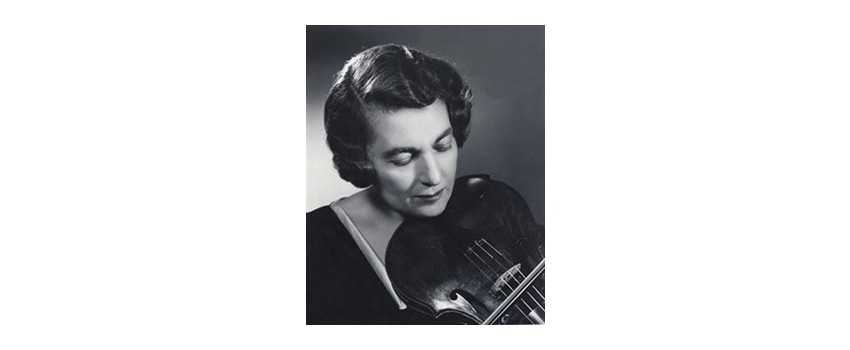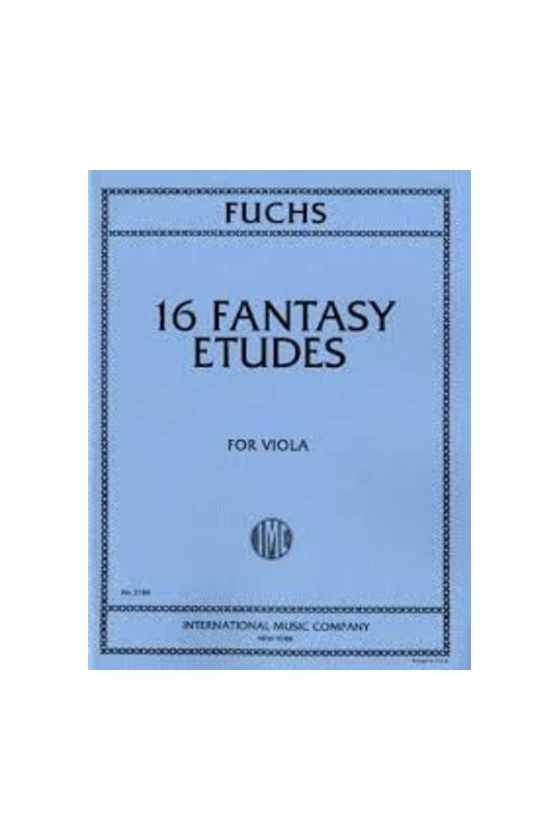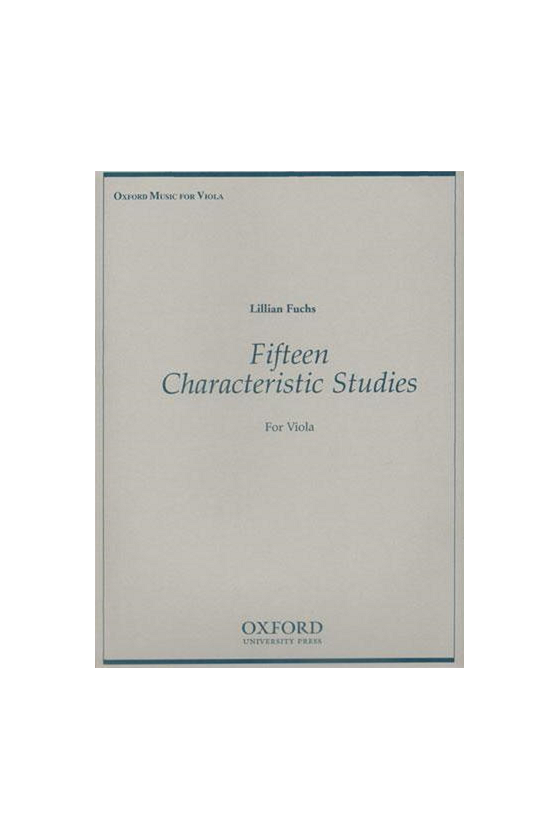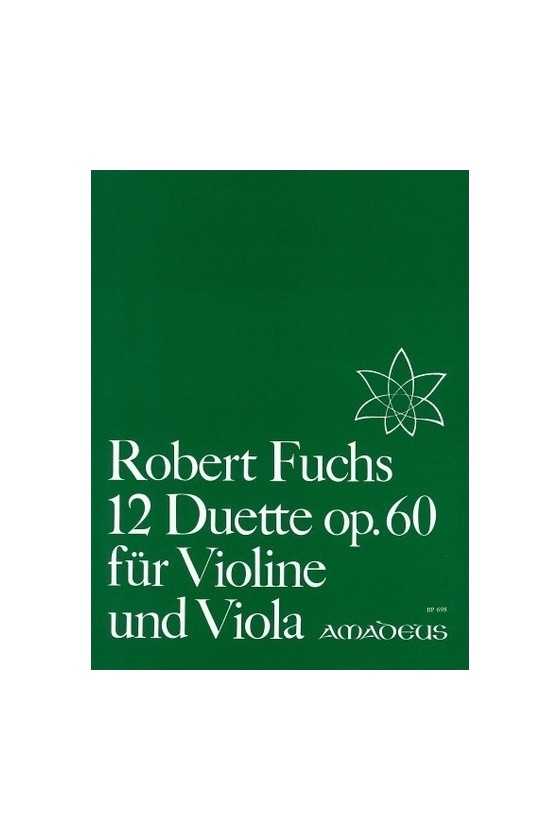Fuchs, Lillian
Lillian Fuchs (18 November 1902 – 5 October 1995) was a violist from the United States and one of the first women to appear in America as a regular string quartet member. In 1926, Fuchs' debut concert as a violinist took place. Invited by Marianne Kneisel to pursue an all-female string quartet the same year, she turned to viola. In 1927, as a violist, Lillian joined the Perolé String Quartet. The Perolé Quartet has been featured on daily Sunday radio broadcasts through WOR in New York City and live concerts. For 15 years, Fuchs played with them and went on to act as a second violist with the Budapest String Quartet, earning her recognition in the highest ranks of chamber music. She started to connect with her brother, Joseph Fuchs, in 1940. Their critically praised Mozart Sinfonia Concertante appearances helped add new life to this and other classical duos.
Lillian Fuchs was a talented instructor and composer best known for her emotional viola performances, which prompted composers to write compositions expressly for her. Fuchs began his musical career as a pianist before enrolling at Juilliard to study violin and composition. After graduation, she switched to viola and joined the Perole Quartet, performing with them until the mid-1940s, when she started touring Europe and the United States. Fuchs wrote music for the viola, violin, and piano, among other instruments. She began teaching at summer festivals in the 1950s before moving on to Manhattan School of Music, Juilliard, and Mannes College of Music to teach. Later in life, she formed the Lillian Fuchs Trio with her twin daughters, resuming her tradition of playing with family.
Musicians and chamber music enthusiasts revere Lillian Fuchs all around the globe. She was a violist, a composer, and a teacher. Her musicianship and vision of the viola's magnificent, dark, deep, human sonority continue to enrich and inspire players who have studied with her, performed her pieces, or heard her unique, passionate playing. Lillian Fuchs started her musical career as a pianist after being born on November 18, 1902, into a family of classical music celebrities. Kate and Phillip Fuchs, her parents, were huge music fans. Her father, a self-taught amateur violinist, taught neighborhood kids how to play the instrument. Her brother Harry Fuchs, a longstanding member of the Cleveland Orchestra, took up the cello. Her brother Joseph Fuchs, a well-known concert violinist and instructor, took up the violin, thanks to their parents' motivation. Lillian Fuchs, a talented pianist who used to accompany her brother Joseph on the piano, had always longed to learn the violin. She studied violin under Louis Svecenski and Franz Kneisel at the New York Institute of Musical Art (now the Juilliard School) and composition with Percy Goetschius, graduating with honors and prizes in both violin and composition.
Lillian Fuchs started her career as a violinist in 1926 but quickly switched to viola and joined the Parole String Quartet, with whom she remained until the mid-1940s. She traveled to Europe and the United States as a solo violist and played chamber music with her brothers. Joseph Fuchs, Lillian Fuchs, Leo Smit, Leonard Rose, Frank Sheridan, and the Kroll Quartet were all members of the Musicians Guild in New York City in the 1940s. They were a significant presence in New York's music scene for many seasons, performing from an extensive repertoire at Town Hall.
Lillian Fuchs made her solo debut at the Casals Festival in Prades, France, in 1953. Throughout the years, she performed and lectured in summer festivals in Aspen, Colorado, and Kneisel Hall in Blue Hill, Maine. For Fuchs, teaching has always been a source of enormous joy and inspiration. She has influenced many of today's most prominent artists by teaching violists and chamber musicians at some of the country's premier institutions. She began teaching at the Manhattan School of Music in 1962, the Juilliard School in 1971, and Mannes College of Music in the 1980s.
Lillian Fuchs' works are less well-known among the general audience. However, three sets of compositions for unaccompanied viola are staples of violists' technical studies: Fifteen Characteristic Studies (1965), Twelve Caprices (1950), and Sixteen Fantasy Études (1961). In addition, she wrote the Sonata Pastorale for solo viola in 1956. Jota and Caprice Fantastique for violin and keyboard are two more compositions that have been released. She also provided distinctive piano accompaniments to some of her brother Joseph's Paganini caprices for violin.
Some of the finest composers of the twentieth century were inspired by Lillian Fuchs. In 1947, Bohuslav Martinu was so moved by Lillian and Joseph Fuchs' performance of Mozart duos that he created and dedicated a set of madrigals for violin and viola to them. They received it a few weeks later. Martinu also began Sonata for Viola and Piano for Lillian Fuchs in 1955. Sonata for Viola and Piano was composed by Jacques de Menasce in 1955; Quincy Porter ordered Duo for Viola and Harp in 1957 and Duo for Violin and Viola in 1962; and Vittorio Rieti composed Triple Concerto for Violin, Viola, Piano, and Orchestra in 1973. Lillian Fuchs was the subject of all of these works.
Lillian Fuchs met a young man while learning to play the viola at one of the numerous musical meetings held at the house of the well-known New York musical patrons, the Leventritts of New York City. Ludwig Stein, a men's haberdashery merchant who was also a fantastic amateur violinist, violist, and pianist, would become her spouse for nearly sixty years until he died in 1992.
Ludwig Stein and Lillian Fuchs' twin daughters have continued the musical legacy. Barbara Stein Mallow is a well-known cellist who performs solo and chamber music and teaches at Queens College's Kneisel Hall during the summer. Carol Stein Amado, a twin sister, is the first violinist of the Amado String Quartet in the Philadelphia region, and she continues the family heritage of teaching and solo performances. For many years, the sisters were members of the Lillian Fuchs Trio, including their mother.
Lillian Fuchs died on October 5, 1995, at the age of ninety-two, at the Actors Fund Nursing Home in Englewood, New Jersey.

Fuchs, 12 Duets For Violin And Viola Op. 60
12 duets op. 60 for Violin and Viola composed by Robert Fuchs. Amadeus publication.



